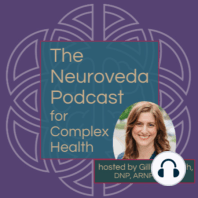2 min listen

#54 Alan Cash: Using Oxaloacetate (Benagene) to support failing mitochondrial energy pathways & scavenge glutamate
#54 Alan Cash: Using Oxaloacetate (Benagene) to support failing mitochondrial energy pathways & scavenge glutamate
ratings:
Length:
61 minutes
Released:
Nov 10, 2021
Format:
Podcast episode
Description
Alan Cash got curious about why our energy pathways fail us. Armed with an MS in physics, he's found himself innovating commercial production methods for oxaloacetate, a metabolite in the citric acid cycle that sits squarely within our mitochondria and are fundamental in producing the ATP that fuel every energy-requiring process in the body. In this episode, we review the nitty gritty details of energy production from the perspective of how oxaloacetate (brand names Benagene and Jubilance) can impact us from the systemic perspective. We don't typically discuss one commercial product on our show, but we have many patients using oxaloacetate and wanted to give a much more complete picture than we can in a clinic visit. Taking oxaloacetate has been shown to decrease NF-kB activation, reduce fasting glucose by ~25% (research from the late 1960's), increase NAD to NADH ratios, increase AMPK, decrease emotional symptoms of PMS (as the product Jubilance) and favorably shift cellular redox. Preliminary data from Mr Cash's current research is showing reduction in fatigue for CFS/ME patients. Remarkably, oral oxaloacetate seems to be able to cross the blood brain barrier (it's a very small molecule!) and can decrease brain glutamate levels. Most remarkably, taking exogenous oxaloacetate can mimic caloric restriction and has increased the lifespan of laboratory animals. It's been used in doses ranging from 100 to 6000mg daily (like for glioblastoma) and has been well-tolerated even at high doses. It's important to know that the commercial products Benagene and Jubilance contain the same ingredients: 100mg of oxaloacetate stabilized by 150mg of vitamin C. To answer another common question, there's no mechanism to turn oxaloacetate into the undesirable 'oxalate' compound in the human body. This tiny molecule really can pack a molecular and anti-inflammatory punch- listen in to find out more!
Resources:
https://benagene.com/
https://jubilance.com/
Oxaloacetate to reduce emotional symptoms in PMS: placebo-controlled, cross-over clinical trial with 48 women (2020): https://www.ncbi.nlm.nih.gov/pmc/articles/PMC7073356/
Safety and target engagement profile of two oxaloacetate doses (500mg & 1000mg twice daily) in 15 Alzheimer's patients (2021) showed the higher dose increased frontal & frontoparietal brain glucose & glutathione per FDG PET scanning despite no changes in serum levels or cognitive scoring. https://pubmed.ncbi.nlm.nih.gov/32715609/
Oxaloacetate activates brain mitochondrial biogenesis, enhances the insulin pathway, reduces inflammation & stimulates neurogenesis (2014) in mice injected with 1-2g/kg once daily dosing x 1-2 weeks. https://pubmed.ncbi.nlm.nih.gov/25027327/
Oxaloacetate supplementation increases lifespan in Caenorhabditis elegans (roundworms) by 25% median & 13% maximal lifespan through an AMPK/FOXO-dependent pathway (2009). https://onlinelibrary.wiley.com/doi/10.1111/j.1474-9726.2009.00527.x
Oxaloacetate: A novel neuroprotective for acute ischemic stroke (2012) via modulation of the glutamate pathway which would also be applicable for other types of brain injury, like TBI (traumatic brain injury). https://pubmed.ncbi.nlm.nih.gov/22085530/
Neuroprotective effect of oxaloacetate in a focal brain ischemic model in the rat (2015) through pathways of glutamate scavenging. https://pubmed.ncbi.nlm.nih.gov/24807461/
Neuroprotective effects of oxaloacetate in closed head injury in rats is mediated by its blood glutatmate scavenging activity (2009). https://pubmed.ncbi.nlm.nih.gov/19543002/
Effect of alpha-ketoglutarate & oxaloacetate on brain mito DNA damage & seizures (2003). https://pubmed.ncbi.nlm.nih.gov/12749815/
Oxaloacetate acid supplementation as a mimic of caloric restriction: https://benthamopen.com/contents/pdf/TOLSJ/TOLSJ-3-22.pdf
Resources:
https://benagene.com/
https://jubilance.com/
Oxaloacetate to reduce emotional symptoms in PMS: placebo-controlled, cross-over clinical trial with 48 women (2020): https://www.ncbi.nlm.nih.gov/pmc/articles/PMC7073356/
Safety and target engagement profile of two oxaloacetate doses (500mg & 1000mg twice daily) in 15 Alzheimer's patients (2021) showed the higher dose increased frontal & frontoparietal brain glucose & glutathione per FDG PET scanning despite no changes in serum levels or cognitive scoring. https://pubmed.ncbi.nlm.nih.gov/32715609/
Oxaloacetate activates brain mitochondrial biogenesis, enhances the insulin pathway, reduces inflammation & stimulates neurogenesis (2014) in mice injected with 1-2g/kg once daily dosing x 1-2 weeks. https://pubmed.ncbi.nlm.nih.gov/25027327/
Oxaloacetate supplementation increases lifespan in Caenorhabditis elegans (roundworms) by 25% median & 13% maximal lifespan through an AMPK/FOXO-dependent pathway (2009). https://onlinelibrary.wiley.com/doi/10.1111/j.1474-9726.2009.00527.x
Oxaloacetate: A novel neuroprotective for acute ischemic stroke (2012) via modulation of the glutamate pathway which would also be applicable for other types of brain injury, like TBI (traumatic brain injury). https://pubmed.ncbi.nlm.nih.gov/22085530/
Neuroprotective effect of oxaloacetate in a focal brain ischemic model in the rat (2015) through pathways of glutamate scavenging. https://pubmed.ncbi.nlm.nih.gov/24807461/
Neuroprotective effects of oxaloacetate in closed head injury in rats is mediated by its blood glutatmate scavenging activity (2009). https://pubmed.ncbi.nlm.nih.gov/19543002/
Effect of alpha-ketoglutarate & oxaloacetate on brain mito DNA damage & seizures (2003). https://pubmed.ncbi.nlm.nih.gov/12749815/
Oxaloacetate acid supplementation as a mimic of caloric restriction: https://benthamopen.com/contents/pdf/TOLSJ/TOLSJ-3-22.pdf
Released:
Nov 10, 2021
Format:
Podcast episode
Titles in the series (84)
Coming Soon: Podcast for Healing Neurology by Neuroveda Podcast for Complex Health